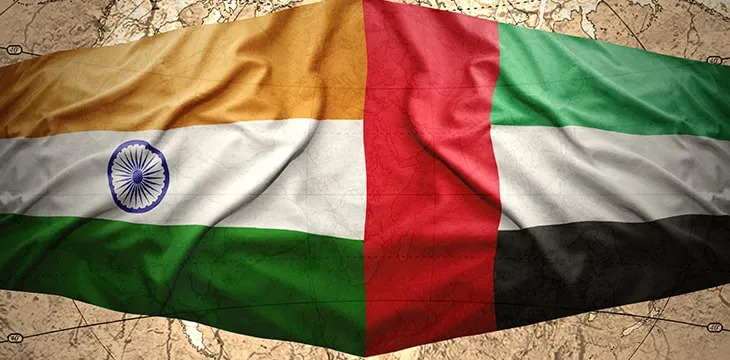|
Getting your Trinity Audio player ready...
|
More details have emerged about the scope of the UAE-India trade agreement that came into force on May 1. The landmark agreement named the UAE-India Comprehensive Economic Partnership Agreement (CEPA) will include collaboration on various emerging technologies and innovations.
Speaking during a webinar organized by the Dubai Chamber of Commerce, Omar Khan, the body’s Director of International Offices, disclosed that one of these focus areas will be blockchain technology. It will also focus on innovation-focused sectors such as AI and Fintech.
CEPA is the first bilateral trade agreement signed between the UAE and India. The trade deal is expected to deepen ties between the two countries significantly.
According to one of the 270 participants of the webinar Deepak Sood, the secretary-general of the Associated Chambers of Commerce and Industry of India, the pact will aid two-way trade between the countries to reach $100 billion in the next five years.
“The UAE is the third-largest trading partner for India and synergizes the scope of business opportunities for stakeholders. The trade pact will aid in taking forward the two-way trade to $100 billion in five years from the existing $60 billion. This is a joint effort to combine the vision of both nations,” said Deepak Sood.
The UAE is rapidly becoming a blockchain innovation hotbed
The deal is not the first the UAE has signed with a trade partner to explore use cases for blockchain technology. Back in 2019, the Dubai Chamber of Commerce signed a similar pact with the International Chamber of Commerce, becoming the first chamber of commerce to do so.
The agreement catapulted the Dubai Chamber of Commerce to become the exclusive provider of blockchain trade solutions in the entire Middle East.
The latest trade agreement with India is in keeping with the UAE’s aim to become a global blockchain hub. The Emirates has been running with this vision since 2016 when the government launched the Dubai Blockchain Strategy.
Since then, it has been expanding its adoption of blockchain technology and currently has more than 50% of its government services powered by the innovation. The government has also been making policies to attract digital currency firms and investors.
This year, it introduced a licensing scheme for digital currency firms. Several digital currency firms have already received their licenses under the scheme.
Watch: The BSV Global Blockchain Convention panel, Blockchain in Middle East & South Asia
https://www.youtube.com/watch?v=RzSCrXf1Ywc&t=11677s

 07-05-2025
07-05-2025 





